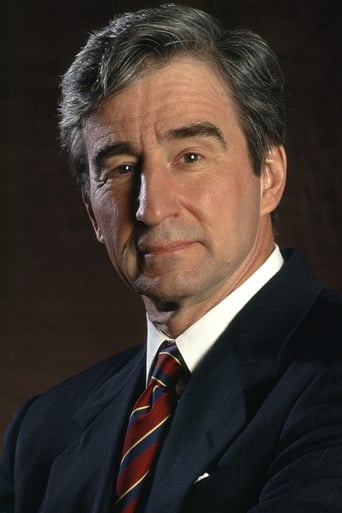Hottoceame
The Age of Commercialism
ChicDragon
It's a mild crowd pleaser for people who are exhausted by blockbusters.
Voxitype
Good films always raise compelling questions, whether the format is fiction or documentary fact.
Catherina
If you're interested in the topic at hand, you should just watch it and judge yourself because the reviews have gone very biased by people that didn't even watch it and just hate (or love) the creator. I liked it, it was well written, narrated, and directed and it was about a topic that interests me.
MartinHafer
As always, this is a top-notch biography by Ken Burns. Lots of interesting and often famous folks are interviewed, lots of paintings and photos are employed with a moving camera and nice evocative music is used to spin the story of Thomas Jefferson's life.The film is broken into two parts when I saw it streaming on Netflix. The first portion is about Jefferson's life from birth until the time of the French Revolution in 1789 (which he was a huge supporter of at the time). Now this film is NOT a white-washing of the man, as it talks about his many amazing gifts but also his intense failing when it comes to human rights and the lack of rights accorded to slaves. While he DID push for this when he was younger, he quickly abandoned this when he saw resistance--and it just didn't seem that important an issue to him. Other topics covered include his family tragedies, the Declaration of Independence, the Revolution and religious liberty. The second portion is about the time of the creation of the government of the new United States up until the death of Jefferson in 1826. Jefferson was serving as a diplomat in France while the Constitution was created and adopted. And, when he returned he was appointed to President Washington's cabinet as the first Secretary of State. However, this was not a great match, as the Federalists (who dominated the Cabinet), had a slightly different view of the role of government--and this ended up causing serious divisions as Washinton's administration and Jefferson eventually quit. Washington had envisioned a system with no political parties--but men with strong views like Hamilton and Jefferson ended up doing just that--creating the first political parties. Eventually, Jefferson was roused from his early retirement when he was elected Vice President under John Adams--and his problems with the Federalists continued. Eventually, he'd have the last laugh as he and his Democratic-Republicans came into power and stayed in power for decades to come (with few interruptions). And, oddly, Jefferson's notions of a small and very limited government were things he violated when he was responsible for the Louisiana Purchase! So much for core political values....Then, following his presidency is a very lengthy portion of the film devoted to his retirement years. His creation of the University of Virginia, financial difficulties and his correspondence (among other things) are the subject of this final portion of the film.By the way, this film seems to give undo credit for the Declaration of Independence to Jefferson. I am NOT trying to discredit Jefferson, but the document didn't just appear out of no where--the context is missing. His writing of the Declaration was STRONGLY influenced by George Mason's Declaration of Rights for Virginia--as well as other documents. In addition, to Jefferson's dismay, his original draft was changed MANY times by the Continental Congress. But this is barely mentioned in the film--and none of the previous Declarations (several States had already issued their own) were mentioned. As a retired history teacher, I have picked up these things over the years--and they are not common knowledge. This is NOT a major criticism--as apart from this the film is exceptional and quite engaging.
pmcguireumc
Any movie that features George Will in the first 10 minutes is worth watching, in my opinion. Will, like Jefferson, is a great, multifaceted thinker. Oh, by the way, did you know Jefferson owned slaves. This is, like all of Ken Burn's films, a wonderful collection of diary readings, oil paintings, heart felt music, warm narration, and thought provoking. Oh, by the way, did you know Jefferson owned slaves. As a huge fan of our nation's first and greatest thinker, I was very hopeful about this film, especially when I saw that Ken Burns produced it. However, the modern political correctness constantly invoked when it comes to the issue of slavery is incredibly distracting. There were almost 25 references to Jefferson's owning slaves in the first 28 minutes. Oh, by the way, did you know Jefferson owned slaves. As long as you can tolerate the repeated onslaught of political correctness (not that this is unexpected from PBS), you will be interested in this documentary.My criticism of course, is the ridiculous interpretation of the past through modern sensibilities. The cost of this however, is a minimal study of America's most enigmatic and great thinker. Oh, by the way, did you know Jefferson owned slaves.
njmollo
Thomas Jefferson by Ken Burns is a reverential documentary but never out of ones mind is that this man of "extraordinary intelligence" deemed the black inferior to the white.This question, probably the most important, is exposed but left unresolved. The only historian to put Jefferson's attitude into any context is a black one.The white historians list Jefferson's many qualities and his desire for "a pursuit of happiness" but each positive quality they list can be juxtaposition with the word "slave".Almost presented as religious scripture, the life of Thomas Jefferson and his ideals are quoted from his documents and letters but it is often forgotten that this man was a politician first and foremost and being so, could easily be classed as a man of malleable and corrupt principles. Is there one politician through out history that was not in some way corrupt?What must be remembered is that when Jefferson uses the word "people"; he is not including the African American. For historians to presume that his carefully crafted words apply to all is a mistake. I for one cannot reconcile the man and his beliefs. To state high principles in published prose yet live the life of a slave owner does not sit easily. His words become far less principled in light of the man's example. Do as I say not as I do.
Howard Sauertieg
I am a fan of Ken Burns films, but "Thomas Jefferson" is probably the nadir of the talking-head living-history documentary style he favors. In many respects "Thomas Jefferson" is a beautiful film, and it is clearly the work of intelligent people. Ultimately it inspires me to visit Monticello, which is admirably photographed. It fails to answer the question it poses at the outset - whether Jefferson the lover of Liberty can be reconciled with Jefferson the Master of Slaves - and by default suggests that raising this question is the film's chief contribution to Jeffersonian discourse. It's a timely question, but it isn't new. The mood of the film is outrageously depressive, a sedate musical score of American chestnuts underscoring lethargic readings from Jefferson's writings, and images of Monticello, slaves, Jefferson (portrait), historically significant parchments, John Adams (portrait), George Washington (portrait), etc. If this film is anything specific, it is a memorial service for the myth of Jefferson. I don't like it, but I appreciate the film maker's effort and the contributions of scholars involved in the project. A related Ken Burns biographical film, "Lewis and Clark," is similar in tone but less confused and more forthright in its storytelling. See it.





